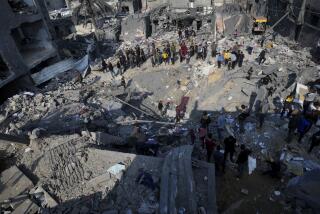Has Saddam Hussein Come Clean? : Iraq: The botulism bombs alone should give the world pause about his trustworthiness.
- Share via
Iraq has proved the skeptics right again. Just because there was no evidence of an Iraqi arsenal of weapons of mass destruction didn’t mean that the weapons didn’t exist. Conversely, the horrific revelations of the past week--evidence of an ongoing Iraqi program to build and maintain stocks of nuclear, chemical and biological weapons--do not mean that the program has ceased to exist.
According to the U.N. Special Commission on Iraq, headed by Ambassador Rolf Ekeus, Saddam Hussein’s government was not only pursuing nuclear weapons; it had also produced thousands of gallons of germ warfare agents, including two of the most lethal, those causing botulism and anthrax, some of which had been kept in combat-ready warheads.
The new information came to light for the same reason our first hard evidence of Hussein’s nuclear program emerged: because a defector had the goods on his government. The information has great credibility because the catalyst for its release was the defection of Hussein’s own son-in-law, Lt. Gen. Hussein Kamel Majid, believed to be the architect of his father-in-law’s program to acquire weapons of terror.
Confirmation of Iraq’s secret biological weapons has appeared after four years of intensive effort to find them, which should temper the optimism of those who once asserted that everything Iraq had done to build weapons of mass destruction had been uncovered long ago. Two years ago, Maurizio Zifferero, an official of the International Atomic Energy Agency, declared the Iraqi case closed. The week before the new information came to light, he boasted that the agency’s monitoring system was so sensitive that Iraq was finally unable to manufacture nuclear weapons without getting caught in the act.
Three years ago, Iraq was found to be deeply into the nuclear weapons business. Zifferero’s team turned up parts for thousands of modern centrifuges to be used for enriching uranium and twin secret factories in which electromagnetic isotope separation technology was already being employed for the same purpose.
Now Ekeus reports that Iraq had accelerated its program to have a nuclear weapon by April, 1991, and that enrichment continued well after the war ended, a disconcerting surprise.
When the newly released documents have been translated and studied, we may find that the Iraqi military succeeded in concealing more nuclear facilities from IAEA inspectors, just as they hid germ weapons from other investigators. But even after the documents have been digested, there will be no ironclad assurance that everything has been found. It is in the nature of intelligence gathering and monitoring that one can identify only what one finds, not what has been successfully hidden.
The latest developments are troubling on two counts. On the most basic level, we now know that Hussein retained the means, and presumably the intent, to devastate entire countries with biological weapons of the most awful kind. Anthrax, unless treated promptly, is almost 100% fatal, and only a few pounds of spores per square mile are enough to annihilate a city. The botulism toxin is even more lethal on a pound-for-pound basis, especially if health care facilities are overwhelmed with thousands of simultaneous cases. Biological weapons, Saddam-style, are probably the most barbarous instruments of human destruction, thousands of times more lethal than the nerve gas used in the Tokyo subway attacks.
Equally troublesome on another level is that Iraq almost managed to persuade the Security Council that the stocks of terror weapons had been destroyed. Instead, Hussein had many tons of biological agents already loaded into warheads, and there are indications that those weapons had been tested.
There must be an end to the games played by Iraq--an end to its smug pretense of complying with the Security Council’s cease-fire resolutions, and an end to its attempts to negotiate sweetheart deals with Russia, France and China in exchange for their pressure to lift the U.N. sanctions. Suspicion must be the operating assumption. In 1993, my own suspicions about Iraqi compliance were frequently considered to be evidence of unreasonable skepticism and stubborn refusal to grant that the inspections had demonstrated, beyond a reasonable doubt, that Iraq had been defanged. Reasonable doubt may no longer be a tenable view; proof beyond a shadow of a doubt that Iraq is in compliance with its obligations may need to be the new standard--if such proof is possible.
If there is any icy comfort to be taken from all of this, it is that Iraq’s biological sword remained in its sheath. Saddam Hussein, the epitome of the rogue dictator with weapons of mass destruction, was assuredly deterred by American nuclear capabilities. Nuclear weapons have been said to be useful only to deter the use of nuclear force by others; that concept may need re-evaluation.
More to Read
Sign up for Essential California
The most important California stories and recommendations in your inbox every morning.
You may occasionally receive promotional content from the Los Angeles Times.













